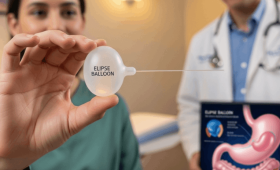Introduction
Gastric sleeve surgery, also known as sleeve gastrectomy, has become one of the most popular bariatric procedures worldwide, especially for individuals struggling with obesity. It offers effective, long-term weight loss and health improvements for conditions such as Type 2 diabetes, hypertension, and sleep apnea. Turkey has emerged as a global hub for bariatric surgery due to its affordable prices, top-tier medical facilities, and highly experienced surgeons. Companies like Cure Holiday provide seamless medical tourism packages, ensuring that patients from across the world can access high-quality gastric sleeve surgery at a fraction of the cost in Western Europe or the United States.
This guide will explore the gastric sleeve procedure in detail, including how it works, who qualifies for it, the benefits and risks involved, and why Turkey—with Cure Holiday’s trusted support—is an excellent destination for this life-changing surgery.
1. What is Gastric Sleeve Surgery?
Gastric sleeve surgery is a restrictive weight loss procedure in which approximately 75-80% of the stomach is removed, leaving a thin, sleeve-like section that reduces the stomach’s capacity. This smaller stomach restricts the amount of food that can be consumed at one time and decreases hunger by reducing the production of ghrelin, the hormone responsible for stimulating appetite.
The procedure helps individuals achieve sustainable weight loss by limiting food intake and reducing appetite, making it easier to maintain a healthy lifestyle. Gastric sleeve surgery does not involve the rerouting of the intestines, which makes it a simpler procedure compared to gastric bypass, with fewer long-term risks.
2. How Gastric Sleeve Surgery Works
- Pre-Operative Preparation:
Before undergoing the surgery, patients must undergo several medical tests, including blood tests, cardiac evaluations, and imaging of the stomach. A pre-surgery consultation with the surgeon and dietitian is essential to establish dietary guidelines for both pre- and post-operative phases. - The Procedure Itself:
- Step 1: The surgery is performed under general anesthesia.
- Step 2: The surgeon makes a few small incisions in the abdomen to insert a laparoscope (a thin tube with a camera) and surgical instruments.
- Step 3: Approximately 75-80% of the stomach is removed along the greater curvature using surgical staplers, leaving behind a banana-shaped tube or sleeve.
- Step 4: The surgeon checks for leaks along the stapled portion of the stomach.
- Step 5: The incisions are closed with sutures, and the patient is taken to recovery.
- Duration of Surgery:
The entire procedure takes 1-2 hours and is minimally invasive, as it is performed laparoscopically (through small incisions). - Post-Operative Recovery:
Most patients stay in the hospital for 2-3 days after the surgery. Full recovery usually takes around 4-6 weeks, with dietary adjustments and follow-up medical visits being essential during this time.
3. Who is a Candidate for Gastric Sleeve Surgery?
Gastric sleeve surgery is suitable for individuals who meet the following criteria:
- BMI (Body Mass Index) of 35 or above, especially if accompanied by obesity-related health issues such as Type 2 diabetes or hypertension.
- BMI of 30-34, with severe health conditions like uncontrolled diabetes or sleep apnea.
- Inability to achieve significant weight loss through diet, exercise, or medication alone.
- Commitment to lifestyle changes, including following a healthy diet and regular exercise.
- No history of severe gastrointestinal disorders or contraindications for surgery.
Patients considering gastric sleeve surgery are typically evaluated by a multidisciplinary team that includes a surgeon, dietitian, and psychologist to ensure they are mentally and physically prepared for the procedure and its lifestyle changes.
4. Benefits of Gastric Sleeve Surgery
- Significant Weight Loss
Patients can expect to lose 50-70% of their excess body weight within 12 to 18 months of surgery. - Reduction in Obesity-Related Health Conditions
Gastric sleeve surgery can lead to the remission or improvement of:- Type 2 diabetes
- High blood pressure
- High cholesterol
- Sleep apnea
- Joint pain
- Reduced Appetite and Hunger Control
By removing the portion of the stomach that produces ghrelin, the hunger hormone, patients feel less hungry and are more satisfied with smaller meals. - Lower Risk Compared to Gastric Bypass
Unlike gastric bypass, gastric sleeve surgery does not involve altering the intestines, which reduces the risk of nutrient malabsorption and dumping syndrome (rapid movement of food into the small intestine causing nausea and dizziness). - Improved Quality of Life
Patients experience better physical mobility, improved mental well-being, and enhanced social interactions.
5. Risks and Considerations of Gastric Sleeve Surgery
While gastric sleeve surgery is highly effective, it does come with certain risks and potential complications, including:
- Surgical Complications: Bleeding, infection, or leakage from the stapled portion of the stomach.
- Acid Reflux: Some patients report increased symptoms of heartburn or acid reflux post-surgery.
- Weight Regain: While rare, some patients may regain weight if they do not adhere to dietary guidelines and lifestyle changes.
- Nutritional Deficiencies: Reduced stomach capacity can lead to insufficient nutrient intake, so vitamin and mineral supplements are often recommended.
- Irreversibility: Gastric sleeve surgery is permanent and cannot be reversed, unlike some other bariatric procedures.
6. Why Choose Turkey for Gastric Sleeve Surgery?
Turkey has become a leading destination for bariatric surgery due to its world-class hospitals, experienced surgeons, and affordable prices. The cost of gastric sleeve surgery in Turkey is significantly lower than in Europe and the United States, without compromising on quality or safety.
6.1. Costs Comparison: Turkey vs. Europe and the U.S.
- Turkey: $3,500 – $6,000 (including hospital stay and aftercare)
- United Kingdom: £9,000 – £12,000
- Germany: €10,000 – €15,000
- United States: $15,000 – $25,000
The cost difference is due to lower operating expenses, government support for medical tourism, and the favorable exchange rate in Turkey. Patients receive the same level of care, or even better, compared to Western countries.
7. Cure Holiday: Your Trusted Partner for Gastric Sleeve Surgery in Turkey
Cure Holiday is a leading medical tourism facilitator in Turkey, known for offering affordable, high-quality healthcare packages. They provide seamless assistance for international patients seeking bariatric surgery, ensuring that every step of the journey—from consultation to recovery—is smooth and stress-free.
7.1. Services Provided by Cure Holiday
- Consultation and Pre-Operative Assessments
Cure Holiday offers online consultations to assess each patient’s medical history and determine the suitability for gastric sleeve surgery. - Accredited Hospitals and Experienced Surgeons
Cure Holiday partners with JCI-accredited hospitals and highly skilled bariatric surgeons to ensure the highest standard of care. - All-Inclusive Packages
The packages include:- Pre-operative tests and assessments
- Surgery fees and hospital stay
- Post-operative medications and follow-up care
- 4-5 star hotel accommodation
- Airport transfers and in-country transportation
- English-speaking coordinators for continuous support
7.2. Why Choose Cure Holiday?
- Affordable Prices: Patients save up to 70% compared to European costs.
- Short Waiting Times: No long waiting lists; patients can schedule surgery at their convenience.
- Comprehensive Aftercare: Cure Holiday offers continuous follow-up to ensure successful recovery and weight loss.
8. Recovery and Life After Gastric Sleeve Surgery
- Post-Surgery Diet
- Phase 1: Clear liquids (first few days after surgery).
- Phase 2: Pureed foods (1-2 weeks post-op).
- Phase 3: Soft foods (3-4 weeks post-op).
- Phase 4: Regular healthy diet (after 4-6 weeks).
- Physical Activity
Patients are encouraged to start with light walking soon after surgery and gradually increase activity levels. After six weeks, more intense exercises can be introduced. - Follow-Up and Support
Regular follow-ups with the surgeon and dietitian are essential to monitor weight loss progress and nutritional intake.
Conclusion
Gastric sleeve surgery is a life-changing procedure that offers significant weight loss and improvement in obesity-related conditions. Choosing Turkey for this surgery, especially through Cure Holiday, ensures that patients receive top-quality care at an affordable price, along with seamless medical tourism services. With world-class hospitals, experienced surgeons, and comprehensive aftercare packages, Turkey has become a preferred destination for bariatric surgery.
If you are considering gastric sleeve surgery, Cure Holiday provides the perfect combination of affordability, safety, and quality, helping you achieve your weight loss goals with confidence.



